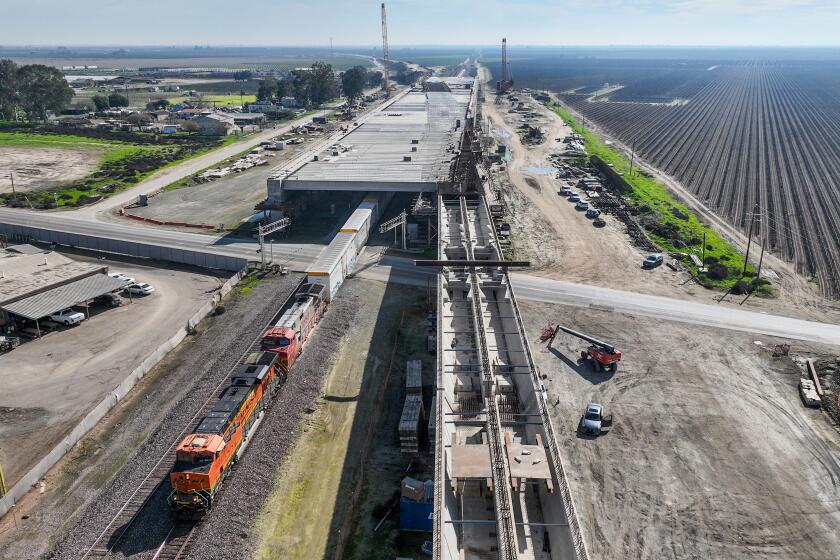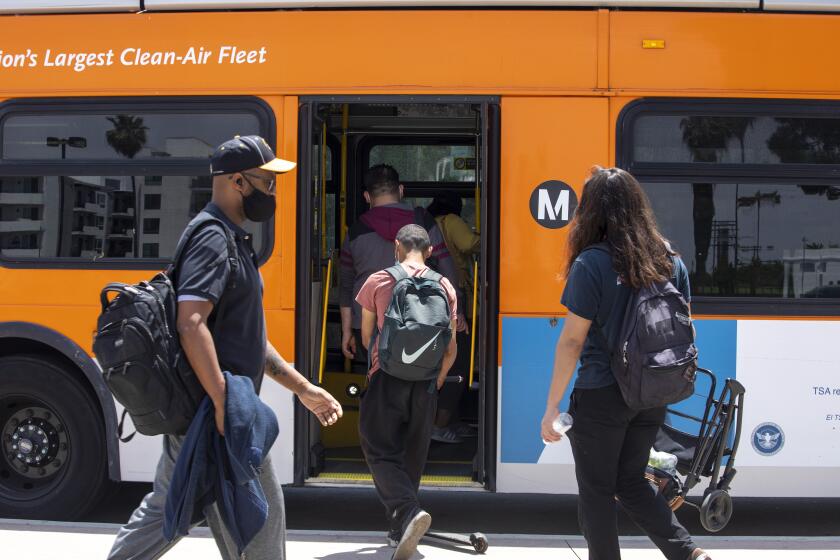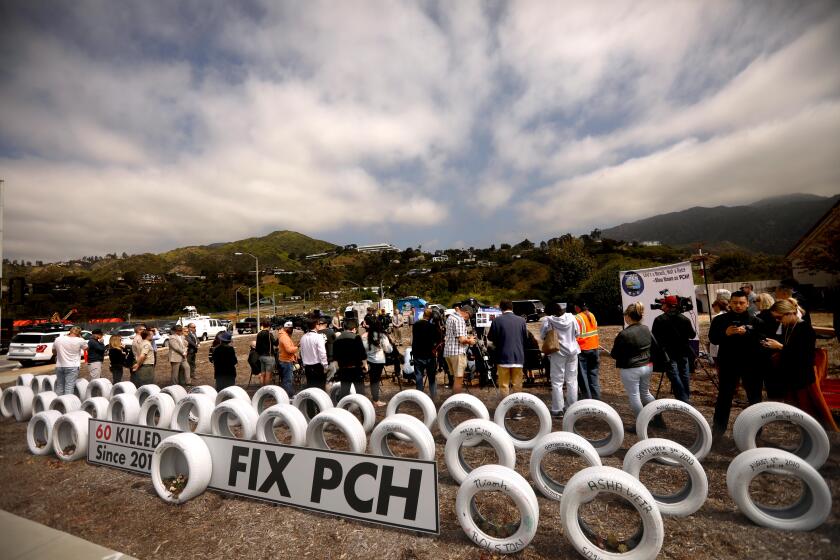Distance Hasn’t Made Friendships Go Slip-Slidin’ Away
We came to this beltway ‘burb for one reason: to ride our friend Bill’s coveted Yardman.
Back home in L.A.’s Mount Washington section, a riding mower isn’t something for which most folks have legitimate use. So when word got back to Los Angeles that our expatriate friend had acquired one--that he had, in fact, enough flat open lawn now to need one--envy ran wild.
Before I prod that green-eyed monster further, though, let’s rewind a few thousand miles of this home video.
We Sipchens have been driving around America for six weeks now as I write this series of stories on family issues, and each new vista has confronted us with a question that probably confronts most Americans when they travel:
“Shall we move here?”
In New Mexico and southern Utah, my wife, Pam, and I found towns where our children--12-year-old Ashley, 10-year-old Emily and 7-year-old Robert--might get up each morning and ride horseback into country so astoundingly beautiful that they almost certainly would be transformed into prophets.
“But we like L.A., Dad,” is what the kids say.
Missouri offered visions of a quiet life along a river, where the kids could be their own Tom Sawyers instead of whatever consumable image Hollywood currently is cloning onto American girls and boys.
“This is great, but we like L.A.”
And St. Augustine, Fla., gave us a glimpse of life lived as God intended--on surfboards, with fly rods, in full siesta mode.
“We like L.A.”
What Pam and I have realized, though, is that any quest for the perfect place hinges on an issue that some people may not think to consider.
It actually dawned on us eight years ago, while we were living in Costa Mesa and shopping for a neighborhood with an easier commute to my job in downtown Los Angeles.
People, we decided, are the most important factor in determining whether folks are happy where they live. Good schools, pretty views, convenient shopping and the like quickly fade in real value if your neighbors are stuffy or stupid or as monotonous as strip-mall nail salons.
Are there people nearby you truly want to know? Are they all just like you or is there sufficient diversity to make encounters interesting? Is every contact a networking opportunity or do people have time to be genuine friends and neighbors?
*
Mount Washington, we found, is thick with people who defy the Southern California stereotype of unconnectedness. In the hillside community northeast of downtown, we’ve met friendly couples and singles, old folks and teens, and have found a bona fide sense of neighborliness. But we were drawn most pointedly to a subspecies of the breed: the Mount Washington parent.
One offshoot of the hill’s community spirit was born nine years ago when a couple of new mothers got together and created the Mount Washington baby-sitting co-op. The idea was simple: Twenty-five families would establish sufficient trust that they would be willing to have their children cared for by any of the others.
When our family joined, it was hard to imagine that the experiment would last, and it’s hard to say why it has thrived and spread (it now involves 35 families). It’s certainly not because we are like-minded in any clubby sense. The co-op’s political spectrum, for instance, ranges from veritable Commie to folks who might have given Joe McCarthy high-fives. There are committed church- and synagogue-goers, quasi-New Agers and, I presume, atheists.
Far from utopian, the co-op has been known to bristle. Cliques form. Feelings get hurt. What binds everyone, though, I think, is that we all take our child-rearing seriously. Each parent in the co-op, it seems, has a different parenting style, from laissez faire to semi-Draconian. And oddly enough, all the kids seem to be turning out well--perhaps, in part, because the styles rub off on each other.
For a while, it looked as if the co-op had conferred upon its members a magical charm against divorce. Then reality caught up, and several marriage bonds snapped in quick succession. Some of those involved, though, say their co-op ties have helped keep their lives from unraveling along with their marriages.
The other modern curse that the co-op can’t entirely counter is rootlessness, and over time, new vistas have lured members away.
Joy and Gary and their children were the first to pull up stakes for Virginia, drawn east when Internet opportunities began to outweigh Hollywood’s. Joy then drafted Bill into the online fold, and he and his wife, Dana, packed up their family and left. At about the same time, the great Microsoft magnet pulled Richard and Susan and their kids north to Washington state.
For a while there, it looked like the co-op had had it. Against all odds, that hasn’t been the case.
*
As it happens, we wheel our RV into Bill and Dana’s driveway in Reston on the same weekend Susan and Richard are visiting. Since this is also the weekend when, back in Mount Washington, the co-op is having its annual camp-out, we declare a symbolic bicoastal reunion, with 2,800 miles between campsites.
Arriving late at night, we considerately refrain from running our sewer hose into our friends’ flower bed. Still, a neighbor demands of Bill: “You got Randy Quaid in there?” (We endure many such allusions to the National Lampoon vacation movies in the course of our noble expedition.)
In the morning, after a month and a half on the road, the kids pour out of the RV and immediately reestablish friendships forged during sits and camp-outs that the younger ones have known their whole lives.
Forget Monument Valley, the Louisiana bayou or Florida’s white sands. “This is the most fun I’ve had in a long time,” I hear Robert tell chums Quinn and Jackson as the boys carry a plastic sword into some medieval landscape of their minds’ invention.
The girls, meanwhile, cluster around Joanna June, giggling and vying for the attention of the two pet ferrets the toddler wears like indulgent stoles.
We had cooked up a plan to link the co-op campers by phone. But everyone’s having too much fun to bother.
Besides, we all know exactly what’s happening as the parallel scenes unfold:
In Virginia, kids scream down a Slip ‘n’ Slide, squirt-gun each other to smithereens and annoy the adults with water grenades.
In California, kids slosh in the waves, shoot each other with squirt guns and ambush adults with water grenades.
In Virginia, the parents barbecue while the kids ride Quinn’s scooter down the driveway, creating alliances and working out complex negotiations about who gets to go when.
In California, parents barbecue while the kids bike around the campground, constructing their own society writ small as they go.
In Virginia, finally, the kids start nodding off and their parents sit around talking, telling stories and sorting out their lives.
In California, the kids also get drowsy and, secure among a community of caring adults, possibly sleep more deeply than most as their parents spin yarns around the campfire, argue politics and, if the stars are out, solve the cosmos’ great mysteries.
The other sound almost certainly heard around the West Coast campfire is grown men grousing that they haven’t ridden Bill’s awesome Yardman--an enticement he holds out in letters and e-mail, hoping to coax visits from his co-op friends.
For my part, I can’t explain how fulfilling it is to ride that mechanical steed through the trees at full throttle.
In truth, though, I must concede that it isn’t the only reason we decided to take a detour on our trip and drop by.
* Monday: Hanging out at a commune.
*
ON THE WEB
Visit the Sipchens on the World Wide Web at https://www.latimes.com/trip/ for maps, journals and sounds from the family’s trip.
Sign up for The Wild
We’ll help you find the best places to hike, bike and run, as well as the perfect silent spots for meditation and yoga.
You may occasionally receive promotional content from the Los Angeles Times.



